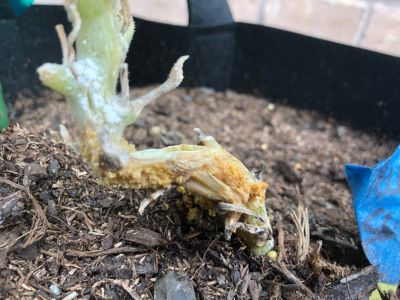Identifying Squash Vine Borer
These squash pests are, unfortunately, tricky to discover before they do damage to your squash plants. The squash vine borer is both a winter and summer squash pest and will affect both types in a similar way. A squash vine borer is a small, cream-colored caterpillar that inserts itself into the inside of a squash stem. They are difficult to see, as they are normally found inside the plant.
Is Your Squash Plant Infested with These Squash Pests?
If a squash vine borer has infested your plants, the result will be a rapid, sometimes overnight, decline of the plant’s health. Leaves will wilt and fruit will fall off the plant before it is mature. Checking the base of the plant will confirm their presence. If it is squash vine borer, there will be a small hole and some sawdust-like residue at the base of the plant.
Removing Squash Vine Borer
Typically, by the time you discover that your plant has been infested with squash vine borers, it’s too late to save the plant. But, if you have been diligently checking the plant and see the distinctive holes at the base of the plant before the tell-tale wilt sets it, you may be able to save the plant by removing the squash vine borer. The easiest way to do this is to wait until dark and examine the plant with a flashlight. The light will shine through the stem except where the squash vine borer is sitting. When you find the squash pests, either carefully slit the stem lengthwise and remove the vine borer caterpillar or use a toothpick or other skewer to pierce through the stem and into the vine borer. After either treatment, bury the vine at the damaged spot. Pesticides — organic or non-organic — will not work after the plants are infested as the stem itself prevents squash vine borers from coming in contact with the pesticide.
Preventing Squash Vine Borer
The best way to control squash vine borers is to make sure you never have them in your garden. As with most pests, good garden maintenance is the key. Be sure to clean up your garden at the end of the year and dispose of any squash plants. If you have had a known infestation of squash vine borers, destroy all plants that were infected. Do not compost them. Rotating squash plants is important as well. The squash vine borer will overwinter in the soil. This will help with preventing squash vine borer, as it will eliminate the host plants in that bed for next year. Pesticides can be applied to the soil at the start of the season to try to kill the squash vine borer in the ground. You can also try to use a squash vine borer barrier. This can be done by wrapping the base of the plant in a light, stretch material, such as nylon. This will prevent the squash pest from getting into the plant. Preventing squash vine borer pests is the best control that you have when it comes to these annoying squash pests.
